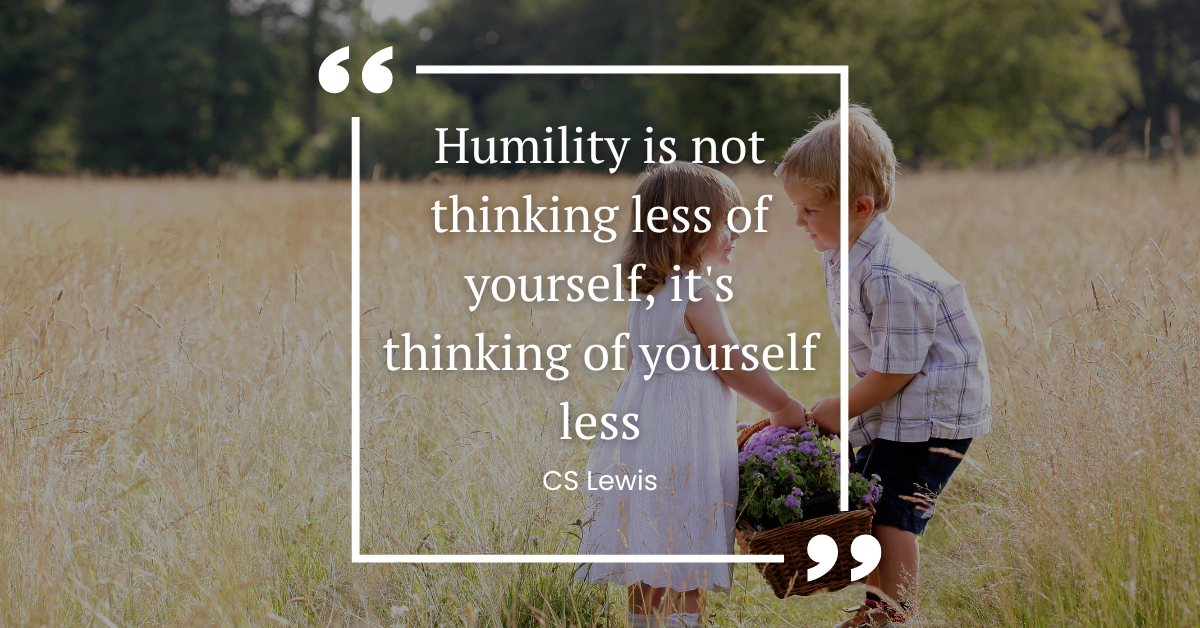How often do you think about your next meal? What about the temperature or how you’re feeling? How often is your attention on your next breath, or if you should take one? Part of human nature is to think, we are thinking creatures, but there are certainly things we think about less than others. There are functions in our body that are automatic and require little to no input from our waking minds, and others that we have to choose. It seems to me that humility can fall into either category.
“humility is the quality of having a modest or low view of one’s importance.”
The dictionary
The dictionary tells us that “humility is the quality of having a modest or low view of one’s importance.” From what I can tell there are many people who take this definition and use it as an excuse to treat themselves with a complete lack of care or compassion.
“Humility is not thinking less of yourself, it’s thinking of yourself less”
CS Lewis
Then there is CS Lewis, author and theologian, who states “Humility is not thinking less of yourself, it’s thinking of yourself less.” I personally love the reframe. Ultimately he is expressing the same opinion as the dictionary, but his reframe can dramatically change the meaning. In his statement he makes it clear that humility is not about treating yourself without kindness, its about living from a place where the ‘you’ of any situation isn’t your foremost priority.
“He must become greater; I must become less.”
John 3:30 NIV
In John 3:30 it says “He must become greater; I must become less.” Like the dictionary definition this could easily be taken in a way that translates to a deprecation of self, so I was thrilled to find this reframe in the notes of the Passion Translation “He is destined to become greater and I must be pruned.”
“He is destined to become greater and I must be pruned.”
The Passion Translation Commentary
How impacting is that? He, meaning God, is DESTINED to become greater. I believe this is true in the timeline of the world as we prepare for the return of Christ. But isn’t it also equally true in our relationship with God. As we grow and mature God naturally becomes more and more in our lives. He becomes our first thought. He moves from being someone we have to remind ourselves to think of, to THE someone we automatically think of and go to in any and every situation. He becomes our everything, while our old everything becomes secondary to Him.
‘I become less’ sounds significantly less scary, less like ‘who I am is going to be erased from the world’ when it’s framed as being ‘pruned’. Granted pruning can be uncomfortable, or downright painful, but ultimately when something is pruned, even if it is pruned back to almost nothing, the root remains. Pruning away the diseased, dying, or unmanageable growth can look downright ugly when it is first done, but the beauty of the plant, just like the beauty in each of us is within the root. As Christians our root is in who Christ designed us to be.
So as God takes up more unconscious and subconscious space in our minds, and we are pruned and shaped back to God’s original intention for us the natural result is humility.
I notice in myself that as I become more spiritually healthy and mature, as I place God first in my life, I have, and am, becoming more neutral about myself. I don’t dislike myself more, nor do I love myself more. If anything the ‘me’ has simply been taken out of the equation. The beauty of this neutrality is that if, and when, I notice that I am thinking of myself significantly more than usual I can recognize that something in my life is out of alignment. Usually I find that I am thinking of, or connecting with God less.
Each of our experiences with setting God up as more and ourselves as less in our lives will look different, but creating space to regularly meet and talk with God is never a bad place to start.
What is one way to make God ‘more’ in your life today?
Karla

